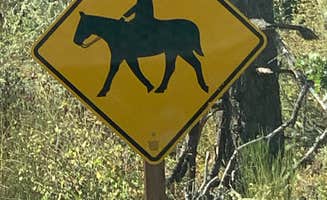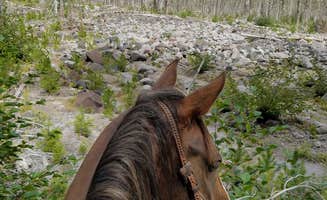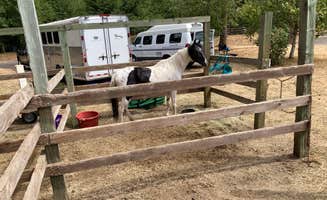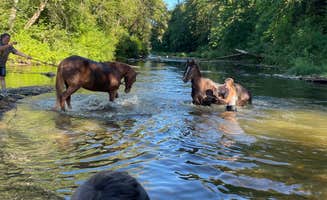Equestrian campers near Camas, Washington find themselves in the western foothills of the Cascade Mountains where elevations range from 400-800 feet above sea level. The region's temperate climate allows for camping most of the year, though facilities at horse-friendly sites often reduce services between October and April. Trail conditions for horseback riders vary seasonally, with spring bringing muddy sections that require appropriate tack and preparation.
What to do
Disc golf near horse trails: At Milo McIver State Park Campground, equestrian campers can alternate between riding and playing disc golf. "Milo McIver may be best known for it's twin 18 hole disc golf courses, or single 27 hole layout when tournaments aren't in progress," explains Steve C., making it easy to mix activities during a multi-day equestrian stay.
River swimming access: Take horses to Oxbow Regional Park where riders can cool off after trail rides. "The river is refreshing on warm days to swim in," mentions J W., while Finn M. notes that "recent upgrades to playgrounds are awesome for the kids." The park offers dedicated areas to secure horses while families enjoy water activities.
Loop riding with elevation changes: Trail riders looking for varied terrain can access multiple loop options directly from campsites. "The surrounding terrain provides varied riding experiences from flat meadows to moderate mountain slopes," with some campgrounds offering paths that ascend 300+ feet within a 4-mile circuit, allowing horses to build stamina on all-day rides.
What campers like
Old-growth forest riding: Horse campers appreciate the mature tree canopy that keeps trails cooler in summer. At Panther Creek Campground, riders access "great trails and the site it's self is very well maintained," according to Cheryl P. The park sits "in a nice forest setting. Nice big sites with a level tent pad," reports Jeff K., creating comfortable base camps for riders.
Lake access for horses: Equestrian campers value spots where horses can safely drink natural water. One camper mentions that "the stones in the stream are a rainbow of metamorphic rock," providing both practical water access and scenic value. Some sites feature gradual entry points where riders can let horses rest their legs in shallow water after long trail days.
Horse-specific amenities: Riders appreciate campgrounds with dedicated equestrian facilities. Lawrence F. notes that "across the road is a horse camp that the PCT goes through," making it convenient to access major trail systems. Several campgrounds within 45 minutes of Camas offer hitching posts, water troughs, and manure disposal areas specifically designed for equine visitors.
What you should know
Reservations essential: Horse-friendly sites fill quickly during peak season. At Battle Ground Lake State Park Campground, Brian B. notes it's "very popular," especially for equestrian sites which often book 3-4 months in advance for summer weekends.
Water access limitations: Not all horse-friendly campgrounds provide direct water for animals. "You are still in the wilderness," reminds Nathan R. at one campground, meaning riders should bring supplemental water or water purification systems for their horses during drier months.
Trail etiquette requirements: Most multi-use trails require riders to yield to hikers and clean up after horses. One camper observed that "owners don't clean up after their horses that go on the trail," creating tension with other trail users. Bring bags or tools to remove manure from heavily used trail sections to maintain good relations with other outdoor enthusiasts.
Tips for camping with families
Horse-watching opportunities: Families without horses can still enjoy equestrian areas. Bjorn S. recommends watching for "horses and fisherpeople" at Beacon Rock State Park Campground, making it ideal for introducing children to horses before investing in riding lessons.
Creek play for kids and horses: Look for campgrounds with safe water features where both children and horses can cool off. One campground offers "creek fun" with "a stream to play at," according to Shannon B., providing natural entertainment that doesn't require additional equipment.
Educational programs: Some horse camps near Camas offer seasonal demonstrations for families. "Visit the camp station area birds on display," suggests Malinda C., highlighting how many equestrian facilities incorporate nature education alongside riding activities, creating multi-dimensional learning experiences for children.
Tips from RVers
Equestrian RV site positioning: At Camp Wilkerson, RV campers with horses benefit from strategically located sites. "We brought a pop up camper and was able to get it set up nicely," reports Don H., noting the layout allows for easy horse supervision from RV windows.
Water pressure considerations: Horse owners with RVs should prepare for variable utilities. One camper mentioned that "water pressure was not very good at around 35 psi," requiring adaptations for efficiently filling large horse water containers. Bring pressure regulators and extra hoses to reach distant water spigots when needed.
Limited cell service: Many horse camps have poor connectivity. Kathy B. explains "Sprint and Verizon have no signal for sure and no Wi-fi is available," making it crucial to download trail maps and emergency vet contact information before arrival. Some equestrian campers bring portable boosters to maintain minimal communications during their stays.





